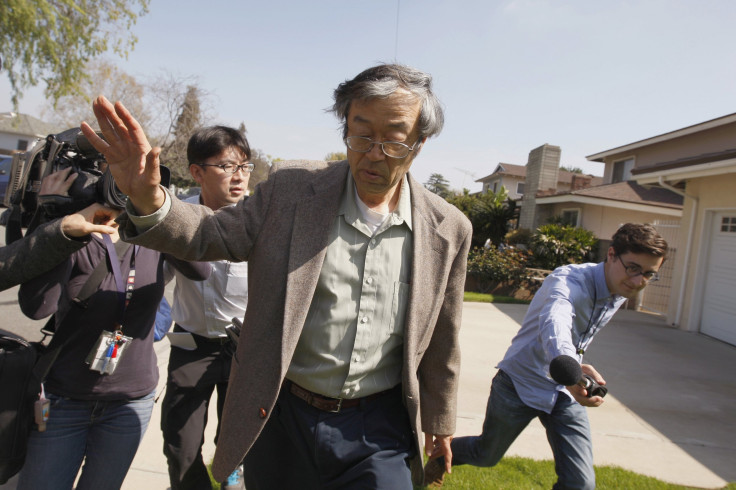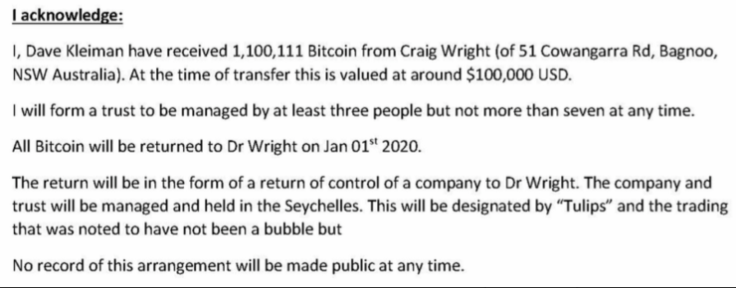Who Is Craig Wright And Is He Really Bitcoin Creator Satoshi Nakamoto? New Evidence Shows He Just Might Be

A pair of reports based on leaked documents and emails claims to reveal the identity of the creator of bitcoin, the world's biggest cryptocurrency, as Australian businessman and academic Craig Wright. But who is the man many now believe to be Satoshi Nakamoto, and how likely is it that he is the inventor of bitcoin?
Bitcoin, a decentralized digital currency was created in 2009, described in a white paper written by an unknown author going by the name Satoshi Nakamoto. Bitcoins are "mined" by solving complex mathematical equations and all transactions are recorded and verified on a public ledger called the blockchain. Worth just fractions of a penny when they launched, the price of a single bitcoin peaked in early 2014 at over $1,000 before plummeting.
Bitcoin is currently trading at over $410 with the entire bitcoin network currently worth over $6 billion. The single biggest bitcoin wallet contains 1.1 million coins (worth in excess of $450 million) and is widely believed to be controlled by Nakamoto.
Given the size, scale and potential future uses of bitcoin technology, it is no surprise that a lot of effort has gone into uncovering just who the creator of this revolutionary technology is.
But We've Been Here Before
Before looking at Wright, it's good to remember that yes, we have been here many times before.
Over the last six years we have seen everyone from an Irish cryptography student, to the U.S.. government and bitcoin's chief scientist, Gavin Andressen, accused of being the pseudonymous Satoshi Nakamoto — but just three of these were ever seen as realistic candidates.
First was Nick Szabo, a reclusive economics professor who wrote about decentralized currencies and "bit gold" prior to the launch of bitcoin. A 2013 stylometric analysis of his writing linked him to the white paper published by Nakamoto describing bitcoin. Szabo has denied being Satoshi.

In the most high-profile "unmasking," Newsweek (owned by International Business Times parent company IBT Media) in March 2014 returned to the stands with a bombshell cover story claiming that the creator of bitcoin was a retired Japanese physicist called Dorian Nakamoto. Nakamoto, whose birth name was Satoshi, claimed he had nothing to do with bitcoin and said his comments were misrepresented by the piece.
Finally, in the wake of Dorian Nakamoto's "unmasking," journalist Andy Greenberg uncovered Hal Finney, a pre-bitcoin cryptographic pioneer and the first person (other than Satoshi himself) to use the software, who was living just a few blocks from Nakamoto. Finney died in August 2014, but he always denied being the creator of bitcoin.
And so we come to Craig Steven Wright.
Who Is Craig Steven Wright?
Both Wired and Gizmodo on Tuesday published reports based on month-long investigations into leaked documents, emails and transcripts from an anonymous source. Both reports concluded that on the balance of probability an Australian businessman and academic named Craig Steven Wright was the man behind bitcoin — though both also flagged the possibility that this was an elaborate hoax.
Unlike the other potential Satoshi Nakamoto suspects, Wright is conspicuous by the fact that he has not been hiding away in some corner of the internet. He has, in fact, been active in pushing his profile as an academic and businessman, and as a result we have a relatively clear idea of who he is.
Having attended high school at the Catholic Padua College in Melbourne, Australia, in the late 1980s, Wright embarked on a remarkable academic career in Australia and the U.K., which by all accounts is continuing today. According to his LinkedIn profile (which has now been wiped, but has been seen by IBT), Wright holds qualifications from the University of Queesland, Charles Strut University, Northumbria University, Sans Technology Institute, University of Newcastle and the University of London.
These qualifications range across topics like computer science, information security management, finance, psychology and international law. Wright is currently listed as attending the University of London to earn a master's of finance degree, which he is due to receive in 2017.
As well as the qualifications from these educational institutes, Wright lists more than 40 professional certifications from GIAC [Global Information Assurance Certification] and the ISACA [Information Systems Audit and Control Association], including for topics like reverse engineering malware and forensic analysis.
The exhaustive list of academic achievements is bolstered by Wired's description of Wright as"an almost obsessive autodidact" and someone who is entirely capable of creating bitcoin and the blockchain technology.
Prolific Businessman
As well as being a prolific academic, Wright is also a serial founder of businesses, with 40 companies alone associated to a single email address for his Hotwire Pre-Emptive Intelligence Group. He is a self-described cybersecurity expert and goes so far as calling himself "certifiably the world’s foremost IT security expert" on Australian academic news website Conversation. Wright has written multiple articles for the site on diverse topics, including a couple criticizing hacktivist group Anonymous and one from 2011 examining why Google didn't catch Norwegian mass murderer Anders Breivik.
His Conversation profile says he has worked on over 1,200 "security-related engagements" with 120 Australian and international organizations in the private and government sectors. Among the more notable of these is designing the architecture for the world's first online casino and helping design and manage the implementation of many of the systems that protect the Australian Stock Exchange.
While most of his professional career centers around cybersecurity, Wright is also heavily involved in the bitcoin community. He has founded several bitcoin-related businesses, including DeMorgan Limited, described as “focused on alternative currency, next generation banking and reputations and education products with a focus on security and creating a simple user experience.”
Last year, Wright announced plans to launch the world's first bitcoin bank called Denariuz Bank, which planned to begin accepting deposits in the second half of 2014 and would eventually offer bitcoin-based equivalents of conventional savings accounts, term deposits, credit and debit cards and loans. The bank never materialized.
DeMorgan Limited is an umbrella company that controls 16 other companies, according to Wright's LinkedIn account. They include Panopticrypt, a security company that Wright introduces in the YouTube video below:
Unlike the mysterious Satoshi Nakamoto, Craig Wright was in fact very much the opposite. His name is plastered all over the internet from accounts on social media sites like Twitter, Facebook, Google+ and LinkedIn to online academic publications, company websites and multiple YouTube clips.
Within hours of the Wired and Gizmodo articles being published, Wright, or someone associated with him, began removing as much of his online presence as possible, though a lot of Wright's online fingerprint remains. He has even written a book.
So What Evidence Links Wright To Satoshi Nakamoto?
This is the first time the Australian has been mentioned as a potential creator of bitcoin, but both Wired and Gizmodo present a lot of evidence to back up their claims. Here is some of it:
- In August 2008, months before the bitcoin white paper was distributed, Wright wrote a post on his (now deleted) blog that says he will release a “cryptocurrency paper” and references “triple entry accounting" -- the name of a 2005 paper from financial cryptographer Ian Grigg that outlines several bitcoin-like ideas.
- On the same blog in November 2008, Wright uses a PGP Key that has been linked to Satoshi Nakamoto. A PGP key is a unique identifier that lets PGP users to send and receive encrypted messages.
- In January 2009, hours before bitcoin was actually launched, Wright wrote a blog post that said: “The Beta of Bitcoin is live tomorrow. This is decentralized… We try until it works.”
- An email sent Jan. 8, 2014, shows Wright emailing three colleagues from satoshi@vistomail.com, the email address that Nakamoto used to regularly communicate with early bitcoin users and developers. In an email with the subject line “Fear of the future” the person behind the Satoshi@vistomail.com account talked about lobbying Australian Sen. Arthur Sinodinos on the matter of bitcoin regulation, signing the email from "Craig (possibly)" and with a phone number belonging to Wright.
- A leaked document shows that a close confidant of Wright, a U.S.-based forensics analyst, was given control of a bitcoin cache of 1.1 million coins that was signed by Kleinman's PGP key. The document shows that the fund -- the only one of its size in existence -- would be given back to Wright in 2020.
- Just two months ago, Wright appears on a bitcoin panel with Szabo and when asked what he does, the businessman said: “[I do] a whole lot of things that people don’t realize is possible yet,” adding “I’m a bit of everything ... I have a masters of law ... I have a masters in statistics, a couple doctorates, I forget actually what I’ve got these days.” When asked how he got involved in bitcoin, Wright pauses for up to three seconds before replying: “Uh, I’ve been involved in all of this for a long time ... I try and stay ... I keep my head down.”
That's All Seems Pretty Conclusive
It does seem conclusive, and on first viewing the evidence presented would seem to categorically prove, that Craig Wright is Satoshi Nakamoto, the inventor of bitcoin. However, as both publications have pointed out, there are some significant oddities and discrepancies that make it a possibility that this is all a hoax.
The first piece of evidence is that the three now-deleted blog posts, which Wired called "smoking guns," have all been edited post-publication to “to insert evidence of his bitcoin history.” There are also questions about the PGP key that was associated with Wright's email address.

Motherboard's Sarah Jeong has looked at this aspect of the evidence and concluded there are two entirely different keys implicated by Wired and Gizmodo, and "neither of them check out." Jeong points out that there is just one key that is completely identifiable as belonging to Satoshi Nakamoto, and the two identified in Tuesday's reports were likely using technology that was available in 2008, which was when the keys are said to have been created.
Forging the date on a PGP encryption key is relatively simple. As it is tied to the date on one's PC, all one has to do is change the system settings before generating the key and for all the world it looks like it was created on the spoofed date. The problems with the validity of the encryption keys has also been flagged by bitcoin core developer Greg Maxwell who said: “This key was also not on the keyservers in 2011 according to my logs; which doesn't prove it was backdated, but there is basically no evidence that it wasn't and non-trivial evidence that it was.”
Another piece of evidence that undermines the claims from Wired and Gizmodo is a posting to the bitcoin-dev mailing list from the satoshi@vistomail.com email address associated with the bitcoin creator with the subject line "Not this again." It says: "I am not Craig Wright. We are all Satoshi." A similar message claiming to come from Satoshi was posted last year in the wake of Newsweek's expose last year on a coding forum, saying: “I am not Dorian Nakamoto.” However, neither denial includes the cryptographic key known to be used by Nakamoto and email headers are relatively easy to spoof.
Michael Goldstein, who describes himself as a "bitcoin minimalist," pointed out on Twitter that the 2009 blog post by Wright about bitcoin being launched was actually published in September 2015:
Ahem. @a_greenberg @gwern @sarahjeong @nathanielpopper @kashhill pic.twitter.com/mBB1NcsggA
— Michael Goldstein (@bitstein) December 9, 2015If It's A Hoax, Who Leaked The Documents?
While Gizmodo and Wired are getting all the attention thanks to their reports, these were not the only publications that were approached by an anonymous leaker. Nathaniel Popper, a reporter with the New York Times who wrote a book about bitcoin called Digital Gold, revealed on Twitter that he had received an email identifying Craig Wright in October, but ignored the tip saying he didn't find it convincing at the time.
Subsequently Leah McGrath Goodman, the Newsweek reporter who wrote the now derided expose of Dorian Nakamoto, revealed that she too had been sent an anonymous email claiming to identify Craig Wright as Satoshi adding that it was "being shopped around fairly aggressively this autumn." Goodman says she ignored the email -- not because, as one Twitter user put it she was "once bitten, twice shy" but because she doesn't respond to anonymous sources.
So who is the person who has been aggressively attempting to out Wright. Gizmodo called the source "someone who worked with Wright who claims to have hacked him" while Wired describes that person as "an anonymous source close to Wright.” The truth, as Kashmir Hill points out, may be much closer to home.
Hill posits that Wright himself may be the person helping expose himself as the real creator of bitcoin. There is evidence that Wright was getting annoyed that others were being credited for his work, and so he set about revealing himself though this elaborate setup.
One such clue is a review Wright himself wrote on Amazon of Popper's book. That review stated, "Always the assumption that [Satoshi Nakamoto] must be a bloody yank. The analysis of who Satoshi is is always so limited." Another clue to Wright's growing anger at others getting credit comes in a leaked email to a colleague in March 2014, just after Newsweek's story was published where he says: “I am not from the bloody USA! Nor am I called Dorien [sic].” Another email sent the same day, entitled "Please Leak," adds: “I do not want to be your poster boy. I am not found and I do not want to be."
Where Is Craig Wright Now?
It is unknown, but it is thought that he is in London. Wright's house and office in Sydney was raided by Australian police on Wednesday, though oddly given the timing, the raids were unrelated to the articles published the previous day, according to a spokesperson for the force. The raids are thought to be related to an ongoing tax issue Wright had with the Australian government.
Prior to the raids, neighbors recall seeing a huge container at the property about a month ago, while a removals van was seen there last week. The landlord of the property said his tenants told him they were planning to move to London, according to a Guardian Australia report and that would tie in with Wright's LinkedIn profile saying he was starting a master's in finance program at the University of London.
To date, however, there have been no sightings of Wright since he became the latest person to be called Satoshi Nakamoto.
So Which Is It -- A Hoax Or The Real Deal?
From the evidence presented here, there are compelling arguments on both sides. According to Popper, from the people within the bitcoin community he has been speaking to, 60 percent say Wright is not Satoshi while the other 40 percent are convinced he is.
Some of Wright's former colleagues, however, are adamant that he is not Satoshi. David Glance, a regular contributor to Conversation, where Wright published some articles, told the Guardian: “There’s absolutely no way in hell that this guy is involved. He was full of himself back then. He never talked about bitcoin, he never wrote about it."
One of the main points that those involved in bitcoin who doubt Wright's claim to being Satoshi make is that his personality doesn't match. Based on the writings we know come from Satoshi Nakamoto, he was a reserved character who was economical with words and -- interestingly -- was a good speller.
Wright on the other hand is a brash and effusive character who seems to have trouble spelling; his book is full of spelling errors. Erik Finmin, dubbed "bitcoin boy" by the New York Times after he made $100,000 from a bitcoin investment made when he was 12, told IBT that he simply doesn't believe Wright matches the profile of Nakamoto.
"Satoshi has been clever in the past hiding himself. He wouldn't foul up on this by posting videos of himself working out, making him look like the founder of bitcoin on his LinkedIn [profile]," Finamin said.
The reality of the situation is that unless Wright comes out of hiding and reveals if he is Satoshi or if it is all a hoax, the debate is likely to continue. Andy Greenberg at Wired probably put it best when he said: "Either Wright invented bitcoin, or he’s a brilliant hoaxer who very badly wants us to believe he did."
© Copyright IBTimes 2024. All rights reserved.






















